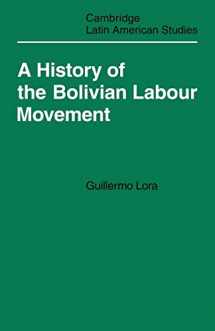
A History of the Bolivian Labour Movement 1848–1971 (Cambridge Latin American Studies, Series Number 27)
ISBN-13:
9780521100212
ISBN-10:
0521100216
Edition:
Reissue
Author:
Laurence Whitehead, Guillermo Lora
Publication date:
2009
Publisher:
Cambridge University Press
Format:
Paperback
424 pages
Category:
Economic Conditions
,
Economics
,
World History
FREE US shipping
Rent
35 days
Due Jun 12, 2024
35 days
from $35.17
USD
Book details
ISBN-13:
9780521100212
ISBN-10:
0521100216
Edition:
Reissue
Author:
Laurence Whitehead, Guillermo Lora
Publication date:
2009
Publisher:
Cambridge University Press
Format:
Paperback
424 pages
Category:
Economic Conditions
,
Economics
,
World History
Summary
A History of the Bolivian Labour Movement 1848–1971 (Cambridge Latin American Studies, Series Number 27) (ISBN-13: 9780521100212 and ISBN-10: 0521100216), written by authors
Laurence Whitehead, Guillermo Lora, was published by Cambridge University Press in 2009.
With an overall rating of 3.8 stars, it's a notable title among other
Economic Conditions
(Economics, World History) books. You can easily purchase or rent A History of the Bolivian Labour Movement 1848–1971 (Cambridge Latin American Studies, Series Number 27) (Paperback) from BooksRun,
along with many other new and used
Economic Conditions
books
and textbooks.
And, if you're looking to sell your copy, our current buyback offer is $0.3.
Description
This book is an abridgement and translation of Guillermo Lora's five-volume history. It deals with the strengthening and radicalisation of Bolivia's organised labour movement, which culminated in the drastic revolutionary changes of the 1950s. The first half offers a reinterpretation of Bolivian history in the century preceding the revolution, viewed from the perspective of the working class. The second half discusses in more detail the major political events and doctrinal issues of a period in which the author, as secretary of the Trotskyist Partido Obrero Revolucionario, himself frequently played an active part. Despite the radical upheaval that occurred in the fifties and the mobilisation of broad sectors of the population around such radical objectives as direct property seizures, union-nominated ministers and union, military and worker control, the labour movement was unable to maintain its conquests in the 1960s. The concluding chapters describe the period of renewed military repression and the continuing efforts of the labour movement to resist.


We would LOVE it if you could help us and other readers by reviewing the book
Book review

Congratulations! We have received your book review.
{user}
{createdAt}
by {truncated_author}


